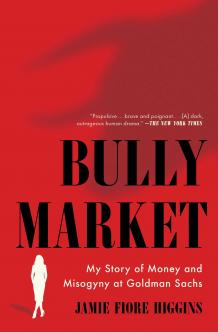Bully Market: My Story of Money and Misogyny at Goldman Sachs
Bookreporter.com Bets On...

About the Book
Bully Market: My Story of Money and Misogyny at Goldman Sachs
September 2022
Over the last few years, what happens in the financial industry has had its time in the spotlight with shows like “Billions” on Showtime and “Industry” on HBO. You watch and think life on Wall Street is really over the top. But that is the Hollywood fictionalized version, right? So when I heard Jamie Fiore Higgins talking about BULLY MARKET: My Story of Money and Misogyny at Goldman Sachs at a Simon & Schuster preview event, I was intrigued. After all, her book is a memoir, not some storyline gone wild just to drive ratings.
The book is a complete page-turner. Why? Not only does it chronicle the life of a woman on Wall Street, it’s an honest look at a woman saying who she was, what she became through her years working at Goldman Sachs, and who she is now. Let me reel things back. Jamie graduated from Bryn Mawr at a time when Goldman Sachs was recruiting people who were not business majors, with an eye on broadening the knowledge base of their team. After a crazy number of interviews, she was hired and dropped into the fast-paced world of finance. In the beginning she “didn’t know a stock from a rock.” But she learned quickly, working long hours --- and achieving rapid success. Her first bonus was twice what she thought it would be. And oh, that money was seductive.
Jamie had grown up in a middle-class family with a plan to become a social worker. But her immigrant parents had worked hard to afford her Seven Sisters education, and they were not out to settle for a low-paying job. They, too, wanted a return on their investment.
At the beginning she works hard, but culturally she feels like an outsider. She does not have the privileged background of many of her fellow employees. She dresses in TJ Maxx sale clothes instead of designer names; her shoes are not Louboutin, and her bag is not Prada. But she hones her skills, works hard, finds a niche to drive up her business, and is made a Managing Partner, which only 8% of Goldman Sachs employees achieve. But along the way she gets caught up in the life. There are drinks and dinners out, along with late nights that rumble their way into early morning hours. She marries, has three children and is on a merry-go-round. Basically she sees her husband and kids on weekends, and during the week she is on the financial treadmill of crunching numbers and client entertaining.
Jamie’s world at home and her world at work are at odds. She has an affair and suddenly is knocked sideways thinking, What am I doing? It’s a wakeup call. From that point on, the goal is to get out. It’s to build a spreadsheet to see what she “really needs” to live a comfortable life going forward. Since she has not fallen into the trap of building a life around material things, she can plot her way out, by working hard with a plan to leave when X is in the bank. That day arrives, the money comes in and she resigns. This is something that people rarely ever do since they are told you only get one chance to work at Goldman Sachs. I have heard from friends who are working on the Street that “you leave when you have had enough or have enough.” Jamie clearly sits in the latter chair.
This book is perfect for book groups. There is lots to talk about. I found myself drawing parallels between scenes in it and one particular publisher when I was at Conde Nast --- the type of leader who was constantly looking for things to trip people up on and gain the upper hand on them. I remember when he left after one year and nine months (yes, I can tell you exactly when he was there), I finally exhaled. So while Jamie’s story takes place on the Street, I feel fairly confident that women can relate to much of what she is sharing.
BULLY MARKET should be an anthem to ending toxic work environments, and Jamie wraps up with ideas on what can be done for a better path forward. Just as this book was being published, Goldman Sachs put out the siren call for all employees to be back at their desks after Labor Day. While business had been conducted from home during the pandemic and there had been success, it was time to take out the handcuffs again and get people seated at their desks five days a week and out there entertaining at night. One of the announcements this week, just the second week back, is how they planned to cut staff in their usual manner, using a version of Jack Welch’s Six Sigma strategy (one that has become very controversial in the past few years), which had not happened during the past couple of years. Interesting as the same game plays on.
Bully Market: My Story of Money and Misogyny at Goldman Sachs
- Publication Date: May 2, 2023
- Genres: Business, Economics, Memoir, Nonfiction, Sociology
- Paperback: 336 pages
- Publisher: Simon & Schuster
- ISBN-10: 1668001039
- ISBN-13: 9781668001035



























